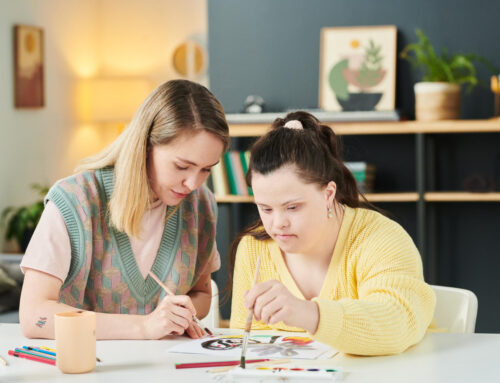Early Onset Schizophrenia and its Impact on Child Development and Function
When we think about the term schizophrenia, we reasonably picture an adult exhibiting bizarre or unexplainable behaviors. However, there is a very rare condition called early onset schizophrenia in which children under the age of 18 experience a break down in mental health. What is early onset schizophrenia? According to the Mayo Clinic (2019), this type of schizophrenia can present with the typical symptoms of hallucinations and delusions in teenagers:
- Hallucinations: Hearing or seeing things that do not exist (i.e. hearing voices, seeing people who others can’t see).
- Delusions: Holding false beliefs (i.e. believing that you are famous when you are not, believing you have superpowers, etc.).
Other symptoms of typical schizophrenia include disorganized thinking or disorganized speech (i.e. word salad or reciprocating inappropriate or odd conversation) as well as negative symptoms with is a reduced capacity to function normally (i.e. lack of hygiene, social withdrawal, disinterest in activities, lack of emotion, monotone speaking, etc.). These symptoms can present in teenagers, but may not yet come to light in children with early onset schizophrenia under the age of 13.
In extremely rare cases, children between the ages of 7 and 13 years can be diagnosed with early onset schizophrenia but the symptomology presents a little differently. The following may or may not be symptoms of schizophrenia in early childhood, according to the Mayo Clinic (2019):
- Language delays
- Late or unusual crawling
- Late walking
Other abnormal motor behaviors — for example, rocking or arm flapping https://www.mayoclinic.org/diseases-conditions/childhood-schizophrenia/symptoms-causes/syc-20354483. The American Academy of Child and Adolescent Psychiatry (2013) states that the following symptoms are often found in children with early onset schizophrenia as the approach the teen years:
- Odd and eccentric behavior and/or speech (so-called disorganized and disordered symptoms).
- Confusing television and dreams for reality (an example of psychosis).
- Extreme moodiness.
- Severe anxiety (due to fear of threatening hallucinations or delusions).
- Difficulty relating to and keeping friends.
- Withdrawing and becoming increasingly isolated.
- Worsening personal grooming (problems with bathing). https://www.aacap.org/AACAP/Families_and_Youth/Facts_for_Families/Facts_for_Families_Pages/ Schizophrenia_In_Children_49.aspx
Schizophrenia is still being heavily researched regarding its etiology. Researchers believe that there are both genetic and environmental explanations for why schizophrenia is triggered in some individuals. As far as function is concerned, schizophrenia left untreated can have a detrimental impact on a person’s ability to carry out day-to-day living tasks. Imagine how hard it would be on a child who is just starting to get used to the requirements of life.
Pediatric occupational therapy has a place in the world of mental health, including any affected individual across the age span. When it comes to early onset schizophrenia for a very young child, an OT’s work may include the following:
-
- Consultation and Evaluation: The OT will want to complete a detailed evaluation of the child, whether that is in the home or in a clinical setting. Assessments will include testing the child’s developmental milestones, tracking strengths and weakness, and how delays are impacting a child’s ability to participate in activities typical of their age.
-
- Interdisciplinary communication and collaboration: Schizophrenia is a very complex disorder, no matter how old the individual. Thus, it would be wise of the OT to collaborate with relevant clinicians who may also be working with the child. This will include pediatricians, mental health counselors, and/or psychiatrists. The OT will need to review the child’s medication schedule, if there is in fact one that has been recommended by a doctor already. The medications schedule will need to be coordinated with the OT intervention in order to help the child participate in the most optimal way possible. Intervention planning: After the evaluation period, the OT will then plan out interventions and goals with the parents and the child. Goals are related to developmental milestones as well as to what area the child or parent’s find the most important. Examples include hygiene, dressing, motor activities (crawling, walking), social participation, academics, play, self-feeding, dressing, sleeping, and community activities just to name a few.
- Caregiver/parent education: Of course, all interventions need to be followed up with education for the parents and caregivers of the child. This includes providing handouts and information that proves helpful for parents and caregivers to carry out interventions in the absence of the OT.





